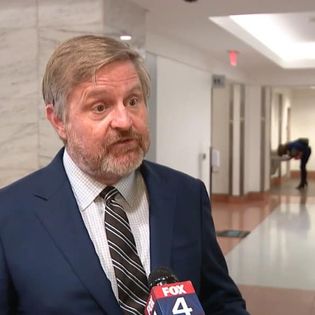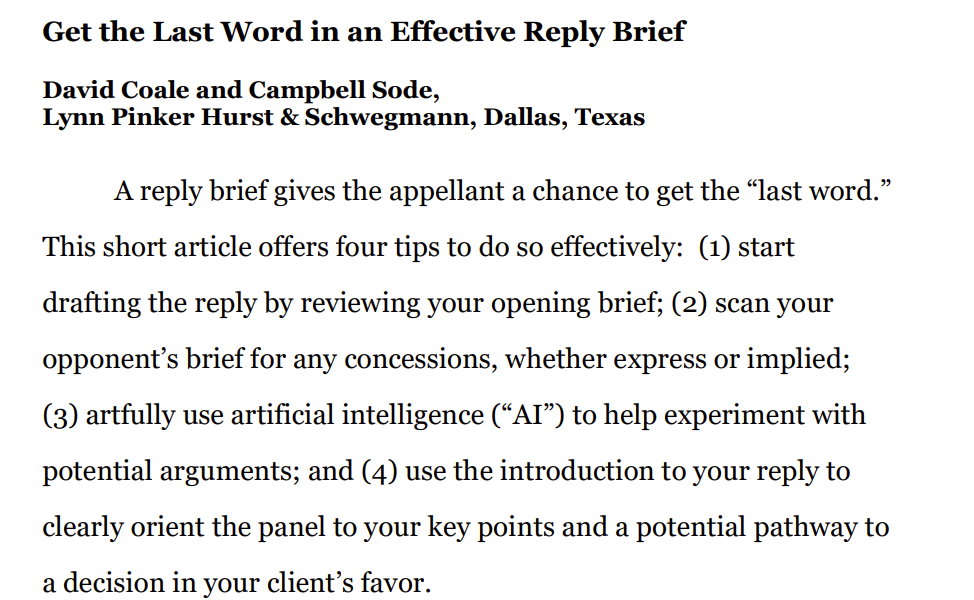This Instagram video with fonts talking to each other is really funny. Thanks to my law partner Mary Nix for sending it my way.
Monthly Archives: January 2024
 This language was sufficient–notwithstanding additional, similar language in other cases on the point–to allow a right of appeal from an artbitration award under the Texas Arbitration Act:
This language was sufficient–notwithstanding additional, similar language in other cases on the point–to allow a right of appeal from an artbitration award under the Texas Arbitration Act:
Notwithstanding the applicable provisions of Texas law the parties agree that the decision of the arbitrator and the findings of fact and conclusions of law shall be reviewable on appeal upon the same grounds and standards of review as if said decision and supporting findings of fact and conclusions of law were entered by a court with subject matter and present jurisdiction.
Multi-Housing Tax Credit Partners XXXI v. White Settlement Senior Living, LLC, No. 05-22-00721-CV (Jan. 26, 2024) (mem. op.).
 In the atypical setting of an appeal from an arbitration award (under the TAA), the Fifth Court concluded that the price set by an option agreement was sufficiently definite:
In the atypical setting of an appeal from an arbitration award (under the TAA), the Fifth Court concluded that the price set by an option agreement was sufficiently definite:
[T]he Option Provision included a formula to determine the purchase price, limiting the purchase price to the greater of the mutually agreed upon appraiser’s calculations, including assumption guidelines for same, or a definite sum of taxes owing, present value of anticipated tax credits not yet received by limited partner, and $100.00. In reaching this conclusion, we reject MHT’s argument that this case is similar to that of Playoff Corp. v. Blackwell, in which the parties entered into an employment contract that promised the employee 25% of a portion of the company’s fair market value upon his termination but did not agree, however, on how the company’s fair market value would be determined, instead agreeing that it would be determined based on a specific formula that the parties would have to agree to in the future after “later negotiations.”
The Court also said: “[W]e agree with other courts that have held that when parties to an agreement specify that a third person is to fix the price, the contract is not unenforceable for lack of definiteness.” Multi-Housing Tax Credit Partners XXXI v. White Settlement Senior Living, LLC, No. 05-22-00721-CV (Jan. 26, 2024) (mem. op.).
The Fifth Court reversed in Monticello Asset Management, Inc. v. Wells, a case about unfortunate contact between a power line and a flagpole during construction work: “The families in this case suffered horrible losses. But Texas law strictly proscribes the liability of premises owners and occupiers for hazards created by the work activity of an independent contractor’s employees over which they had no control.” No. 05-22-00709-CV (Jan. 23, 2024) (applying Coastal Marine Serv. of Tex. v. Lawrence, 988 S.W.2d 223 (Tex. 1999)). A dissent argued that the majority characterized the accident too narrowly.
The Fifth Court affirmed a temporary injunction about unwanted surveillance in Daugherty v. Ellington, stating: “Under this record, we conclude Daugherty engaged in conduct that violated the ‘right to be left alone from unwanted attention’ and is properly protected by injunctive relief. The trial court could reasonably conclude Ellington proved a probable right of recovery on his invasion of privacy claim even though Daugherty engaged in conduct while on public property.” No. 05-22-00991-CV (Jan. 17, 2024) (mem. op.). (LPHS represented the appellee in this case.)
Please join the Dallas Bar Association Appellate Section at noon on Thursday, January 18, for a lunch presentation by me. I’ll be speaking on trends and cases to know from the past year in the U.S. Court of Appeals for the Fifth Circuit and the Fifth District Court of Appeals. I’ve done a similar presentation around this time of year for a few years now.
Here’s my PowerPoint. This CLE will be in-person at the Arts District Mansion, 2101 Ross in downtown Dallas.
 The parties’ agreement said that “[Arbitrator’s] determination may not be appealed to any court or other third party but will be binding on all parties.” The Fifth Court held that this language was not a waiver of the right to vacate or modify an award under the Texas Arbitration Act: “[A] waiver of appeal in the arbitration agreement does not preclude judicial review of matters concerning [statutory modification].” Tye v. Shuffield, No. 05-02-00163-CV (Jan. 5, 2024) (mem. op.) (citations omitted).
The parties’ agreement said that “[Arbitrator’s] determination may not be appealed to any court or other third party but will be binding on all parties.” The Fifth Court held that this language was not a waiver of the right to vacate or modify an award under the Texas Arbitration Act: “[A] waiver of appeal in the arbitration agreement does not preclude judicial review of matters concerning [statutory modification].” Tye v. Shuffield, No. 05-02-00163-CV (Jan. 5, 2024) (mem. op.) (citations omitted).
 The Fifth Court reversed an award of “loss-of-use” damages, involving the right to move a billboard, in Remington Sherman Automotive, LLC v. FMG North Texas, LLC:
The Fifth Court reversed an award of “loss-of-use” damages, involving the right to move a billboard, in Remington Sherman Automotive, LLC v. FMG North Texas, LLC:
FMG’s conversion claim is premised on Remington wrongfully refusing to allow FMG to remove and relocate its billboard after the lease’s termination. Thus, to recover damages for loss of the billboard’s use resulting from Remington’s conversion, FMG had to establish the profits it could have earned if Remington had not prevented it from removing and relocating the billboard. Instead, over Remington’s objection, FMG presented evidence only of the amount of revenue FMG could have earned if Remington had allowed it to keep using the billboard on Remington’s property—a measure inconsistent with the legal and factual basis of FMG’s conversion claim. Absent any vidence showing the profits FMG could have earned at another location if allowed to remove and relocate the billboard, which FMG acknowledges it did not provide, the evidence is legally insufficient to support any loss-of-use damages.
No. 05-22-01366-CV (Dec. 27, 2023) (mem. op.) (emphasis added).
 The Fifth Court rejected a challenge, based on a contract’s venue clause, to the confirmation of an arbitration award, in Picone v. Cruciani:
The Fifth Court rejected a challenge, based on a contract’s venue clause, to the confirmation of an arbitration award, in Picone v. Cruciani:
The concept of venue speaks to the place where a lawsuit is to proceed. See id. It does not speak to the manner in which a dispute will be resolved. Nor is a provision calling for venue in Dallas County courts mutually exclusive from an arbitration provision: even if the parties agree to arbitrate their differences, a court must confirm the arbitrator’s award, and a venue provision determines where that confirmation will take place. The venue provision in the 2020 Release and Settlement has no bearing on the arbitrability of any claim between these parties.
No. 05-22-00841-CV (Dec. 21, 2023) (mem. op.) (citations omitted).
Note that new supersedeas rules are now in effect, changing the rules about “alternate security” (for actions filed after September 2023), and eliminating the longstanding requirement the court clerk approve a supersedeas bond before it becomes effective (effective for all actions).
 In a contract case, the Fifth Court rejected an appellant’s challenge to contract enforceability, when the record showed that the appellant judicially admitted the validity of the contract at trial to seek recover on a counterclaim.
In a contract case, the Fifth Court rejected an appellant’s challenge to contract enforceability, when the record showed that the appellant judicially admitted the validity of the contract at trial to seek recover on a counterclaim.
While the opinion resolves the case by finding a judicial admission, that finding plainly arises not just from a few words in the counterclaim, but from the entire conduct of the trial (in other words, it’s not a “gotcha”).
That said, the opinion’s a reminder that to avoid later confusion, it can be important to identify when a matter is pleaded in the alternative. Advantage Aviation Technologies, Inc. v. Axcess Aviation Maintenance Servs., Inc., No. 05-23-00344-CV (Dec. 27, 2023) (mem. op.).
Start the New Year out right with “Get the Last Word in an Effective Reply Brief,” which I recently co-wrote for the Bar Association of the Fifth Federal Circuit with my skillful colleague Campbell Sode – available here along with many other valuable practice pointers by members of that great bar association.
In a per curiam opinion, the supreme court reversed a Thirteenth Court opinion involving persistent – if unlucky – efforts to get a case to the court of appeals: “Mother timely noticed her appeal from both judgments under consideration by the court of appeals. The court of appeals erred in rejecting jurisdiction after Mother relied on the appellate court’s ruling rendering her initial appeal interlocutory.” In the Interest of A.C.T.M., No. 23-0589 (Dec. 29, 2023).


